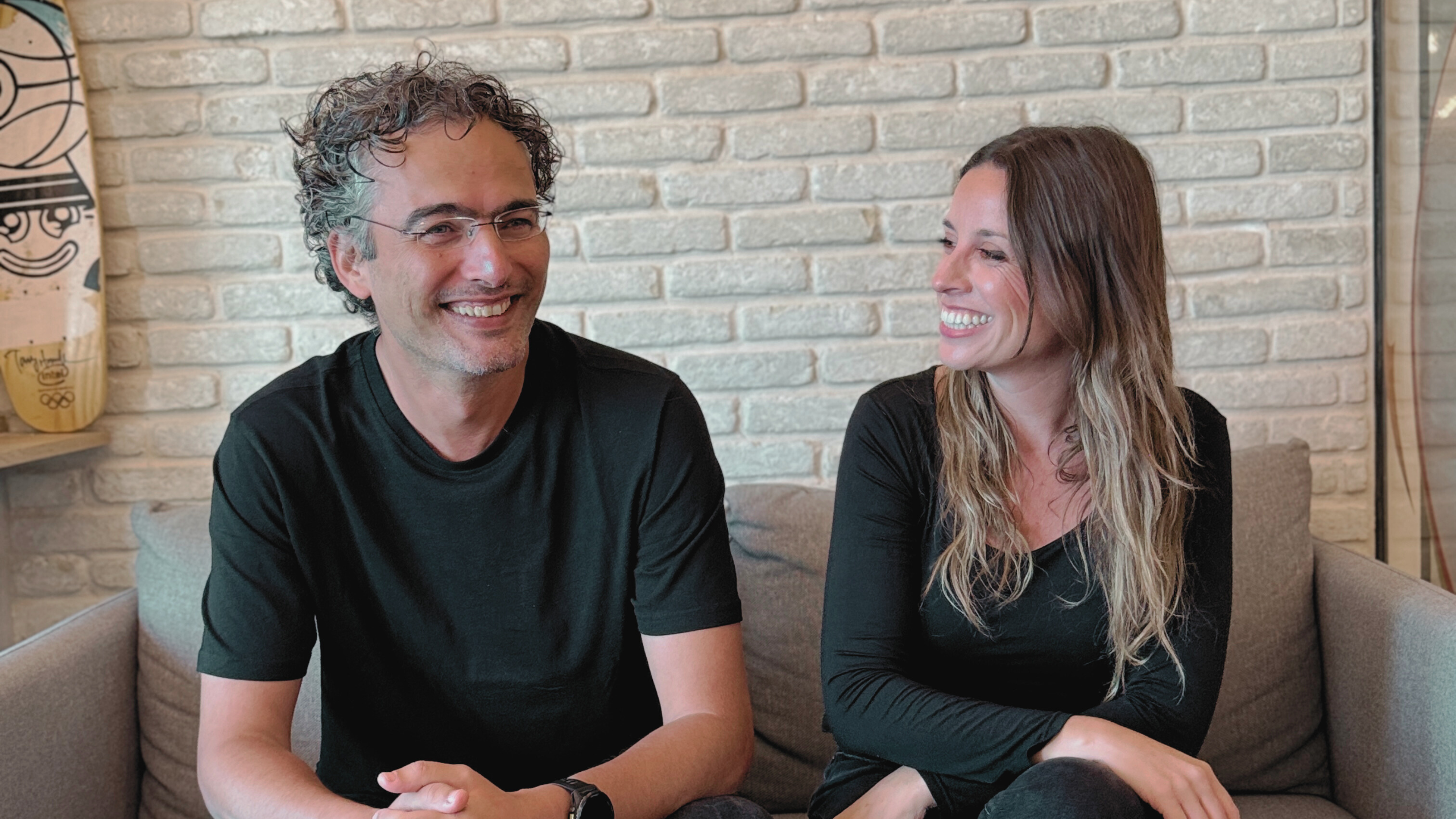This past week, Amir Taiar and I were in Hannover, Germany for HANNOVER MESSE, the world's largest industrial trade show that has been running since 1947. It's one of the world's most influential trade fairs, held annually at the Hanover Fairground in Germany (the second-largest exhibition site in the world), attracts approximately 100,000-200,000 visitors, and features around 4,000 exhibitors showcasing roughly 14,000 products and solutions in automation, energy technology, robotics, and digitalization.
I've been to quite a few industrial and manufacturing shows in the last year, but when I was invited to speak at on stage about industrial AI, I didn't know what to expect. I got dozens of emails about the AI-focus of the show, but I wasn't sure if they were just playing into the current hype rather than reflecting real industrial priorities.
Well, we walked those halls (thousands of steps a day) to figure it out, and we were mindblown. After several days of meetings, presentations, and both in-depth and casual conversations with vendors in the massive exhibition space, we came away with a few insights that reaffirmed why we're so excited to continue building Bardin (formerly known as ‘Folio’) for this sector. Here's a bit about what we learned:
AI Adoption in Industrial Settings
The AI conversation was everywhere but not in the way you might expect. Major players aren't tiptoeing around AI; they're building serious internal copilots and agentic tools right now. Walking through their exhibits, it was clear that AI is a core component of their current product strategy. The sophistication of these implementations surprised even us, and we spend our days thinking about and building industrial AI.
Pragmatic Approach to AI
There's surprisingly little fear about implementation. The attitude is more "prove it works, and we're in." It's a healthy skepticism rooted in practicality, not resistance. This pragmatism makes perfect sense in industries where downtime costs millions and reliability is paramount. Rather than rejecting new technologies outright, we found industrial leaders asking sharp, thoughtful questions about real-world performance and measurable outcomes. They're ready to embrace solutions that deliver genuine value (cough, cough…).
The Hardware-Software Convergence
The hardware itself is often just the beginning. The real differentiator is increasingly the software layer that runs on it or the support that comes with it. Almost all big industrial hardware companies are aggressively shooting into software, and the physical and digital worlds are completely intertwined. We saw traditional hardware manufacturers proudly showcasing their software capabilities, with many positioning themselves as technology or automation companies rather than just OEMs or component suppliers. This shift is creating fascinating opportunities (including opportunities for us at Bardin) at the intersection of physical and digital solutions.
The Product Line Complexity Challenge
Most industrial companies sell multiple product lines or families that each live in their own separate worlds. Take Beckhoff Automation for example: they offer industrial PLCs, fieldbus components, drive systems, and software solutions, each with dedicated teams. Product managers with engineering backgrounds juggle dozens of products while trying to answer questions that should be findable in datasheets or manuals. But with thousands of pages of specs spread across systems that would take hours to search thought, the sales and service teams resort to asking the engineers or the product teams the questions (some of these engineers receive the same questions repeatedly), creating massive inefficiencies that technology should be able to solve (hint: we’re solving it).
The Engineering-Sales Connection
You simply cannot sell in this world without having an engineering background or an engineer with you. What became crystal clear is that customers don't buy unless they both clearly understand the technical value and the business value, and bridging that gap in a classic sales manner is incredibly hard. I watched countless sales conversations where the technical details were covered brilliantly but the business case fell flat unless they called someone else in, or vice versa. When both elements align, the deals move forward. This dual translation capability is essential for industrial sales (and that’s where we come in…).
Experienced but Adaptable Sales Force
Many European industrial sales reps have been at their jobs for 10+ years, yet despite their established ways, they seemed genuinely open to new approaches. There's wisdom there, not resistance. These veterans have seen technologies come and go, but what struck us was their curiosity about new tools, like Bardin, that could enhance rather than replace their expertise. They understand their customers at a profound level, creating relationships that combine technical knowledge with deep trust built over years of collaboration, and are incredibly open to 10x-ing their productivity.
The European Family Business Advantage
Companies like Beckhoff, Phoenix Contact, EUCHNER GmbH + Co. KG, and more have built legacies and loyalty in Europe through founder-led or family ownership models. You can feel the difference in how they operate. Their booths were showcasing modern and innovative products while telling multi-generational stories of historical expertise and commitment. These companies think in decades, not quarters, fostering cultures where employees stay for entire careers and customers build relationships that span generations. This reaffirmed our belief that once you're in, you're in – the turnover in this space, both in terms of employees and partnerships, is minimal. Deep relationships become embedded in the business fabric. For us, this means that when we offer a new solution that can help, without necessarily asking them to end things with another vendor, there's room for a long and deep relationship that can evolve over years or even decades.
The Tech Giants Are All In
The biggest players were there, and I don’t mean the obvious SAP and Siemens, but also Google, Microsoft, Amazon Web Services (AWS), etc. all trying to prove why they were value adds to the industry. It was fascinating to see these tech giants working so hard to establish their relevance in industrial settings, a clear sign of how important this sector has become to their growth strategies. Their massive booths and dedicated industrial solutions teams showed just how seriously they're taking manufacturing and industrial markets. The interesting twist was that while these tech giants were focusing heavily on production and operations AI, they had largely overlooked the go-to-market side of industrial businesses. When we showed them what we were building and discussed our roadmap, it became clear we were addressing a blind spot in their strategies, creating an opportunity for us to lead in this specialized niche.
The SME Opportunity
Like in the B2B software space, you have your huge players, the ones attempting to build their own internal tools. But the vast majority of companies are SMEs (around €500M-€1B in annual revenue) that are able to compete technologically with the big guys but aren't at a place to build or manage internal AI software builds. These mid-sized companies have the technical sophistication and ambition to leverage cutting-edge solutions but lack the massive development teams of their larger competitors. They're hungry for partners who understand both their industry and emerging technologies, creating a perfect opportunity for focused solutions like ours that deliver immediate value.
The GTM AI Gap
While AI for the machinery floor dominated conversations, we discovered a significant gap in how the industry approaches the latter part of the value chain: the go-to-market process. When we showed potential customers what we were building for sales engineers and teams, most didn't believe it was possible. Conversations with massive players in Cloud, ERP, and CRM confirmed we were already ahead of them in this specialized area. The industry has invested heavily in production and operations AI but has largely overlooked the enormous potential for AI to transform how complex industrial products are sold.
Industrials Are Unexpected Trailblazers
We need to completely stop thinking of industrial companies as old-school. Full stop. Agentic AI tools were everywhere. The sophistication of AI implementations we saw would surprise many in the B2B software and consumer tech world, with applications focused on solving complex real-world problems. Chatter around AI wasn’t just a marketing exercise like I had initially considered; organizations were actually deeply investing in technologies that can transform operations, product development, and customer experiences.
Our Feet Hurt But It Was Worth It
Walking the halls of Hannover Messe deepened our commitment to Bardin's mission. Every lesson we gathered reinforced why our AI platform for industrial GTM is so desperately needed.
We learned that the industry faces tremendous complexity selling technical hardware and software with aftermarket services across diverse channels to customers who need both technical and business value. We saw how the engineering-sales gap, overwhelming product complexity, and the hardware-software convergence all create communication challenges that even experienced sales teams struggle to overcome.
What became clear was the significant gap in go-to-market AI solutions compared to factory-floor technology, revealing an opportunity where Bardin is already ahead of major players. The fair helped crystallize our product roadmap as we confirmed that our pragmatic approach to industrial AI aligns perfectly with the market's needs, positioning us precisely where both the legacy giants and SMEs are creating space for specialized solutions.
Most importantly, we built incredible connections with potential customers, partners, and industry experts who validated our approach and opened doors to new opportunities. In an industry built on relationships and trust, these face-to-face interactions were invaluable.
I'm actually writing this on a train from Hannover to Munich for bauma, the world's largest trade fair for construction, building, and mining machinery. Held every three years, this massive event attracts over 500,000 visitors and more than 3,200 exhibitors from around 60 countries. Over the next few days, I'll be speaking with some of the world's largest machinery OEMs, diving deeper into their perspective on these same challenges. It's another opportunity to validate what we learned at Hannover Messe and further refine our understanding of how Bardin can best serve this vital sector.
As we continue this journey, one thing is certain: We feel really lucky to be building for industrials. Our mission of enabling them to be more efficient and productive as they bring their vital products to market, has never felt more vital or more possible than it does today.
.png)

.png)

.png)

